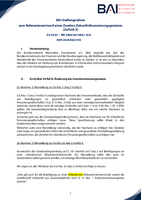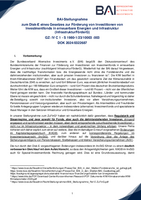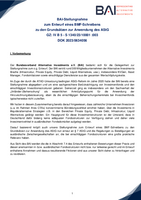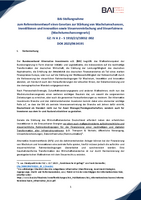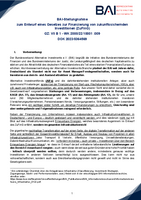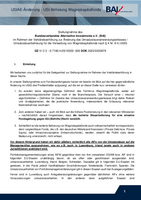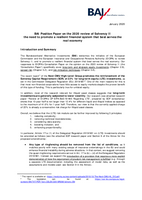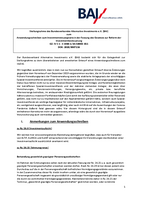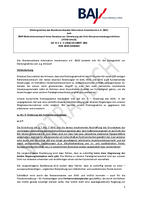Bundesverband Alternative Investments e.V. (BAI)
The topic investment taxation includes in particular the taxation of investment funds and their investors on the basis of the Investment Tax Act (InvStG), which was completely reformed by the Investment-Tax-Reform-Act with effect from 1 January 2018. More specific details and explanations on the InvStG can be found in a number of circulars issued by the German Ministry of Finance.
In addition to the InvStG, there are a number of other tax laws relevant for investment funds and their investors which play an important role in the association's activities. These are, for example, at the national level the foreign taxation act (AStG), the income tax act (EStG), the trade tax act (GewStG) or the value added tax act (UStG), or at the European or international level the amending directive on the mandatory automatic exchange of information (Directive on Administrative Cooperation - DAC), with the implementation of OECD standards and the Anti-Tax Avoidance Directive (ATAD). The plan for a financial transaction tax (FTT) could also be resumed by the EU.
InvStG
Legal text
Diskussionsentwurf des BMF vom 21. Mai 2024 (in German)
Circulars related to the Investment Act (in German)
BMF-Schreiben vom 21. Mai 2019 (zu §§ 1 - 12, 15 - 24, 50 und 56 InvStG)
BMF-Schreiben vom 28. Juli 2020 (Bezugsschreiben zu Auslegungsfragen)
BMF-Schreiben vom 29. Oktober 2020 (zu §§ 27 - 29, 32, 40, 48, 51 - 54 InvStG)
BMF-Schreiben vom 20. Januar 2021 (zu §§ 17, 26, 30, 31, 35, 37, 44, 45 InvStG)
BMF-Schreiben vom 29. April 2021 (zu §§ 2, 20, 33, 36, 49 InvStG)
BMF-Schreiben vom 1. Juni 2021 (zu § 7 InvStG)
BMF-Schreiben vom 18. Juni 2021 (zu §§ 34, 38, 39, 42 InvStG)
BMF-Schreiben vom 18. August 2021 (zu §§ 17 und 22 InvStG)
BMF-Schreiben vom 15. März 2022 (zu §§ 17, 22, 31, 32, 37, 40, 49, 50, 56 InvStG)
BMF-Schreiben vom 6. September 2022 (zu §§ 7, 8, 33, 35, 36, 41, 46, 47, 49, 50, 56 InvStG)
BMF-Schreiben vom 30. Dezember 2022 (zu §§ 31 und 33 InvStG)
BMF-Schreiben vom 5. September 2023 (zu §§ 19 und 31 InvStG)
DAC
DAC 6
Council Directive (EU) 2018/822 amending Directive 2011/16/EU as regards mandatory automatic exchange of information in the field of taxation on reportable cross-border arrangements of May 25, 2018 (DAC 6) requires EU Member States to create rules under which certain cross-border tax arrangements are to be reported to the tax authorities of the Member States and then automatically exchanged between the Member States.
DAC 6 was transposed into German law with the "Act on the Introduction of an Obligation to Report Cross-Border Tax Arrangements" of December 21, 2019. The law came into force on January 1, 2020.
Directive (EU) 2018/822 and thus also the Act affect cross-border tax arrangements for which the first step of implementation took place after June 24, 2018. Notifications of cross-border tax arrangements have been required since July 1, 2020. These notifications must subsequently be entered in an EU central directory in order to enable the automatic exchange of information between countries.
Gesetz zur Einführung einer Pflicht zur Mitteilung grenzüberschreitender Steuergestaltungen
DAC 6 (RICHTLINIE (EU) 2018/822)
Informationsseite des Bundeszentralamtes für Steuern (BZSt) zu DAC-6
DAC 7
On January 1, 2023, the Act on the Reporting Obligation and Automatic Exchange of Information of Reporting Platform Operators in Tax Matters (Platform Tax Transparency Act - PStTG) came into force. The Act is part of the Act implementing Council Directive (EU) 2021/514 of 22 March 2021 (DAC 7) amending Directive 2011/16/EU on administrative cooperation in the field of taxation and modernizing tax procedural law of 20 December 2022.
The PStTG introduces an obligation for operators of digital platforms (platform operators) to report information on income generated by providers on these platforms to the BzSt under certain circumstances. It merely regulates procedural rules with the aim of providing the tax authorities with better access to information in order to gain knowledge of the economic activities of providers on digital platforms. The PStTG does not contain any substantive provisions and does not affect other tax laws. In particular, the PStTG has no effect on laws relating to individual types of tax and regulations.
In principle, information on providers based in Germany as well as those based in other European countries must be reported.
BMF-Schreiben zur Bekanntgabe des amtlich vorgeschriebenen Datensatz gem. § 15 Abs. 1 Satz 2 PStTG
DAC 8
The proposal for a directive to amend the EU Directive on Administrativ Cooperation with regard to the exchange of information in connection with crypto assets (DAC 8), which is being driven forward by the EU Commission, is progressing. In December 2022, the EU Commission had paved the way for such a directive, which is currently being discussed in ECON; an opinion of the European Parliament is also still pending. The aim of DAC 8 is to increase tax transparency in the area of crypto assets and to combat tax evasion or tax avoidance.
DAC 8 is intended to create tax reporting requirements for investments in crypto assets, ultimately ensuring that income from them can be subject to taxation. The DAC 8 directive ties in with the definitions of the so-called Markets in Crypto-Assets Regulation (MiCA) and supplements them with regulations on the exchange of tax information. At the same time, the anti-money laundering provisions are also supplemented. Specifically, DAC 8 obliges the tax authorities of the EU member states to automatically exchange information regarding decentrally issued crypto-assets, stablecoins, e-money tokens and certain NFTs, which must be provided by crypto service providers obliged to report. In addition, DAC 8 includes new reporting requirements for high net worth individuals and strengthened requirements for the submission of tax identification numbers (TINs).
From January 1, 2026, the automatic exchange of information on crypto assets between EU member states is to come into force. To support this, the EU Commission plans to develop an IT tool for TIN verification. The EU Commission intends to establish a central register by December 31, 2025, which will only be accessible to the authorities of the member states and the EU Commission itself. Standard forms for the exchange of information are also planned to be adopted before January 1, 2026. A minimum retention period of five years is planned for the exchanged information.
ATAD
The Council Directive of 12 July 2016 laying down rules against tax avoidance practices directly affecting the functioning of the internal market (Anti-Tax Avoidance Directive / ATAD), as amended by Article 1 of the Council Directive of 29. May 2017 amending the Directive as regards hybrid arrangements with third countries (ATAD II), obliges the EU Member States to adapt, in particular, their tax rules on destratification and exit taxation (Article 5 ATAD), on addition taxation (Articles 7 and 8 ATAD) and on neutralization of taxation mismatches in connection with hybrid arrangements (Articles 9 and 9b ATAD), to the extent that these do not already meet the minimum standard set by the ATAD. The need for implementation resulting from the ATAD is addressed in the ATAD Implementation Act (ATAD-UmsG).
FTT
The financial transaction tax is a tax levied on trading in securities or derivatives. It is thus an instrument for curbing complex financial innovations and speculative financial transactions such as regulatory arbitrage, flash trading and excessive leverage and speculation.
Since 2011, negotiations have been underway to introduce an EU-wide financial transaction tax. However, the plans have not progressed for years.
In January 2019, Germany and France made a new push, proposing to introduce a financial transaction tax with a tax rate of 0.2 percent on the purchase of securities and limiting it to shares in large companies with a market value of more than one billion euros.
FoStoG and Pre-Marketing
According to the new and EU-uniform definition, pre-marketing is - in short - the direct or indirect provision of information on investment strategies or investment concepts to potential professional investors domiciled in the EU in order to test their interest in a fund that has not yet been launched or for which there is not yet a sales notification in the respective member state.
The Fund Location Act (FoStoG) implements changes to European law requirements from June 2019 in the form of EU Directive 2019/1160 amending the UCITS Directive and the AIFM Directive, as well as Regulation (EU) 2019/1156 on cross-border fund distribution (pre-marketing).
In summary, the FoStoG provides for the following changes in tax law:
- VAT exemption for the management of venture capital funds
- Tax incentives for employee share ownership programs
Pre-Marketing - FAQ
BAI, July 2021


